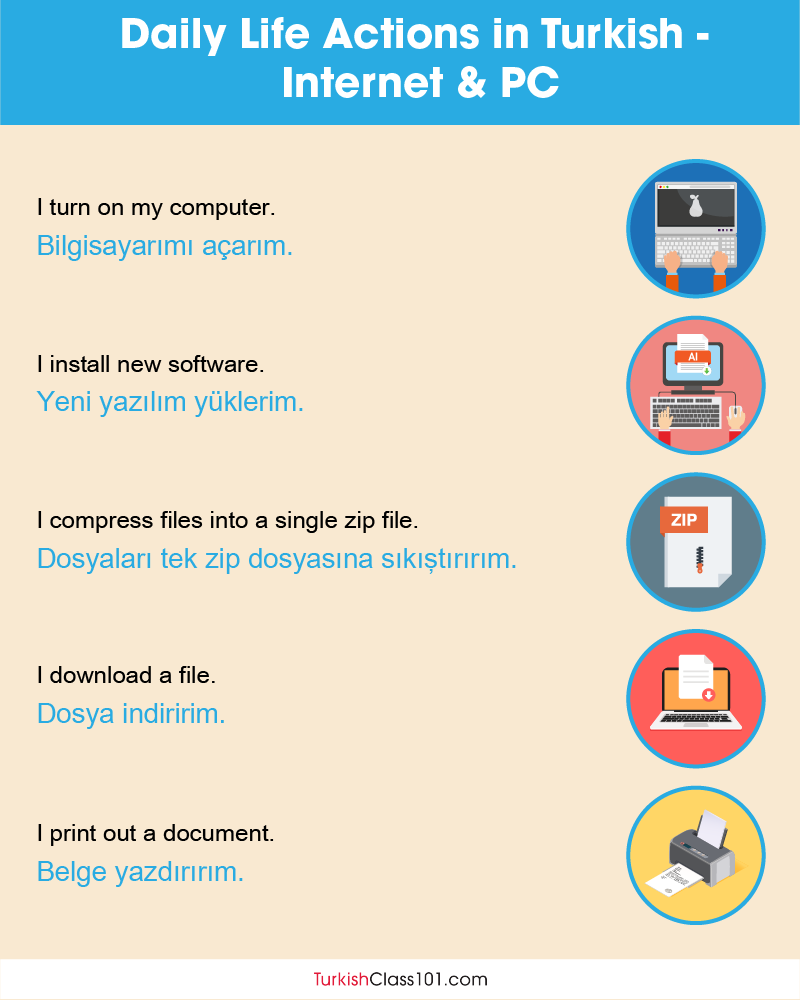Have you ever heard of “Turkish bird language?” If you have, please note that I’m not talking about Turkish whistling language, which farmers use. When I was a kid, my friends and I used to talk in a bird language, putting “ge, ga, gi, gu, gö, gü” after each syllable. It wouldn’t have sounded like Turkish to a foreigner learning the language.
Nowadays, Turkish slang for the internet is very popular. And guess what? When you read these words and expressions, you might think they don’t sound like Turkish either. They remind me of the good old days! You need to know about these slang words and abbreviations to figure out this new language!
Let’s start with regular Turkish slang words and then continue with internet and text slang.
Table of Contents
- What is Slang?
- Turkish Internet/Text Slang
- Sample Turkish Internet Slang Phrases
- Go Beyond Turkish Slang
1. What is Slang?
Essentially, slang is a more informal and playful way of using a given language. It’s often very different from how people usually speak or write in that language.
1- Why is it used?
People, especially the young generation, use slang a lot because they think:
- It’s fun and witty.
- It’s friendlier.
- It expresses nuances better than formal language.
- It communicates more quickly.
- Parents and others won’t understand what they’re talking about.
- It’s understood within a certain group.
- It shows that they belong to a certain group.
2- What is internet or text slang?
These days, nearly everyone has a smartphone, so the internet, social media usage, and text messaging are very popular. They became the most common channels for chatting.
Young people use abbreviations, acronyms, and slang words when chatting. By using these special characters, they type faster and save time. Even though the older people think it’s nonsense, younger people think it’s cool!
People of many different disciplines have been studying and discussing internet and text slang as a social topic. Some psychologists think it leads to a lazier generation who will look for shortcuts in other areas of their lives. Linguists think it’s unnecessary and it ruins languages.
3- How is internet or text slang different?
Internet and text slang and the slang we use in daily life are alike in the sense that they may both include swear words. However, internet and text slang consists of abbreviations, acronyms, symbols, and characters not usually found in the spoken word.
2. Turkish Internet/Text Slang
Everything we discussed above also relates to Turkish slang. In this article, I will talk about Turkish internet words and Turkish text slang words, and will provide translations for you. Daily slang in Turkish will be covered in another article, and for the purpose of this article, I won’t mention Turkish internet slang swear words, either. (You can refer to Wikibooks if you’re curious about this topic.)
Turkish internet slang phrases include:
- Slang words
- Abbreviations and acronyms
- Characters that stand for emotions/emoticons
Slang Words
Some Turkish slang words are also used in Turkish internet slang phrases and as Turkish text slang words. Here are some examples:
- Bro:
- This is the short form of the word “brother” in English. It’s used as “friend.”
- Mal:
- This word in Turkish means “goods” or “estate.” However, in slang, it means “stupid” or “idiot.”
- Cool:
- This Turkish slang term comes from English. It’s used with its original English meaning.
- Efso:
- This is the short form of the word efsane in Turkish. It means “legend.”
- Popi:
- This word is used for the word popüler in Turkish, which means “popular” in English.
- Ponçik:
- This is a word that doesn’t exist in Turkish. Boys and girls call each other ponçik, which basically means “nice” or “cute.”
- Sayko:
- When the word “psycho” in English is pronounced, it’s written as sayko in Turkish. It’s used with the same meaning in English.
- Ciciş:
- This refers to somebody who is “nice and sweet.”
- Kanka / Kanks / Kanki / Panpa:
- All of these words are used to say “buddy.”
- Kıro / Kro:
- Both of these words mean “yokel.”
- Cringe:
- This is used to express embarrassment on behalf of somebody else.
- Challenge yapmak:
- This Turkish texting slang means “to call out.”
- Like atmak:
- This one is used to express the act of liking something on Facebook.
- Sahiplemek:
- This means that two people are compatible with each other.
- Trip atmak:
- This means “to attitudinize.”
- Trollemek:
- This one means “to create trouble.”
- Keklemek:
- This word is “to deceive.”
- İfşalamak:
- This one means “to reveal.”
- Abrvtns and Acrnyms:
- This means “abbreviations” and “acronyms.”
Now, here comes the fun part, if you like to solve puzzles!
Usually, three-letter abbreviations are used to shorten words. In most cases, vowels are omitted and sometimes acronyms are used.
Refer to the table of abbreviated Turkish slang expressions below to see the commonly used abbreviations and acronyms when texting. If you’d like to test yourself, you can easily close the second column!
| Abbreviation/Acronym | Turkish | English |
|---|---|---|
| Slm | Selam | Hi |
| Mrb | Merhaba | Hello |
| Nbr | Ne haber? | What’s up? |
| Nslsn | Nasılsın? | How are you? |
| Nrd | Neredesin? | Where are you? |
| Nzmn | Ne zaman? | When? |
| Tmm / Tm / Ok / Okey / Oki | Tamam | OK |
| Tbr | Tebrikler. | Congratulations. |
| Tşk | Teşekkürler. | Thank you. |
| Kib | Kendine iyi bak. | Take care. |
| Grşz | Görüşürüz. | See you. |
| Hg | Hayırlı günler. | Have a good day. |
| Inş | İnşallah | Hopefully |
| Muck / Mck / Mujk | Öpüyorum. | Kisses |
| Ss | Seni seviyorum. | I love you. |
| Sçs | Seni çok seviyorum. | I love you very much. |
| Ajkm / Aşkm | Aşkım | My love |
| Cnm | Canım | My soul |
| Tnşlm | Tanışalım. | Let’s get to know each other. |
| Abv | Allah belanı versin. | God damn you. |
| Aeo | Allaha emanet ol. | Literal translation: Be entrusted to God. (Used when saying bye) |
| Bgn | Bugün | Today |
| Yrn | Yarın | Tomorrow |
| E | Evet | Yes |
| H | Hayır | No |
| Dm | Usually, this is the abbreviation used by those who want to send/receive private messages. | Direct message |
| By / Bb | Güle güle | Bye / Bye bye |
| Knk | Kanka / Dostum | Buddy / My friend |
| Ayn | Aynen | Exactly |
| Mük | Mükemmel | Perfect |
| Arv | Allah rahatlık versin | Literal translation: Hope God gives comfort.
It’s used when someone is going to sleep, sort of like “Goodnight, have a nice sleep.” |
| Gt | Geri takip | Follow back |
| Kt | Karşılıklı takip | Follow mutually |
I wonder how well you did guessing the shortened words!
Some Turkish people, especially those who speak English, might also use the following acronyms that are commonly used in English:
- LOL: Laugh out loud
- Bff: Best friends forever
- Np: No problem
- OMG: Oh my God!
- Thx: Thanks
Characters That Stand for Emoticons
There are so many emoticons/emojis that can be used these days. However, in the past, we used to use some characters that stood for emotions. Some people still use them, especially those who are middle-aged.
Here are the most frequently used ones:
| : ) or : -) | Smiley or happy face |
| :))) or :)) | Very happy |
| : ( or 🙁 | Unhappy |
| 😀 | Laughing |
| ; ) or ;‑) | Wink |
| 😛 | Tongue sticking out |
| @}->– or @}‑;‑’‑‑‑ or @>‑‑>‑‑ | Rose |
| ♥ | Heart |
3. Sample Turkish Internet Slang Phrases
Let’s look at some Turkish slang phrases in action and have a little more fun. 🙂
| Person | Text message | Proper Turkish | English |
|---|---|---|---|
| 1 | mrb aşkm 🙂 nslsn? | Merhaba aşkım, nasılsın? | Hello my love, how are you? |
| 2 | iim, sen? | İyiyim, ya sen? | I’m fine and you? |
| 1 | İi, tşk | İyiyim teşekkürler. | I’m fine, thanks. |
| 2 | nzmn gidiosun? | Ne zaman gidiyorsun? | When are you going? |
| 1 | yrn | Yarın | Tomorrow. |
| 2 | Özlicem. kib | Özleyeceğim. Kendine iyi bak. | I’ll miss you. Take care. |
| 1 | Sen de. sçs | Sen de. Seni çok seviyorum. | You, too. I love you very much. |
| 2 | Sçs, muck | Seni çok seviyorum. Öpüyorum. | I love you very much. Kisses. |
| 1 | muck | Öpüyorum. | Kisses. |
Wow, did you count how many words they saved when texting? It’s incredible!
I don’t use a lot of abbreviations when I’m texting. Therefore, it’s a little difficult for me to create different examples. Here’s another one that I got from this website:
| Person | Text message | Proper Turkish | English |
|---|---|---|---|
| 1 | Nbr knk? Knsr vr glcn mi? st 23:30 da | Ne haber, kanka? Konser var, gelecek misin? Saat 23:30’da. | What’s up, buddy? There is a concert. Will you come? It’s at 23:30. |
| 2 | Nrd knk? | Where is it, kanka? | Where is it, buddy? |
| 3 | Stdyumda | Stadyumda. | It’s at the stadium. |
| 4 | Oki. glcm | Tamam. Gelicem. | OK. I will come. |
You can click here to see more examples.
4. Go Beyond Turkish Slang
I’m sure this article will prevent you from falling behind in understanding Turkish internet slang phrases and Turkish text slang words in your daily life. However, please don’t forget that you’ll need proper Turkish, especially at work, school, or in formal meetings or gatherings. Turkish internet words won’t help you much when you need to communicate in formal Turkish.
TurkishClass101 will help you build a strong grammar infrastructure and improve your vocabulary. We have tons of vocabulary lists with audio recordings, and free resources including a dictionary you can easily refer to.
You can also download the app for free and use it wherever you are.
Don’t forget that there’s also MyTeacher, which is a Premium PLUS service of TurkishClass101 that you can use to practice with a private teacher.
As usual, we can’t wait to hear your feedback about your experience with the services offered at TurkishClass101!
Before you go, let us know in the comments what the most popular slang words and phrases are in your own language. We’re curious!


















